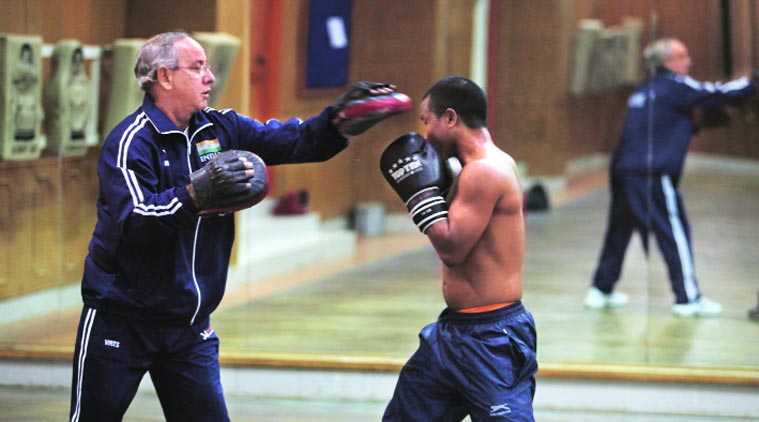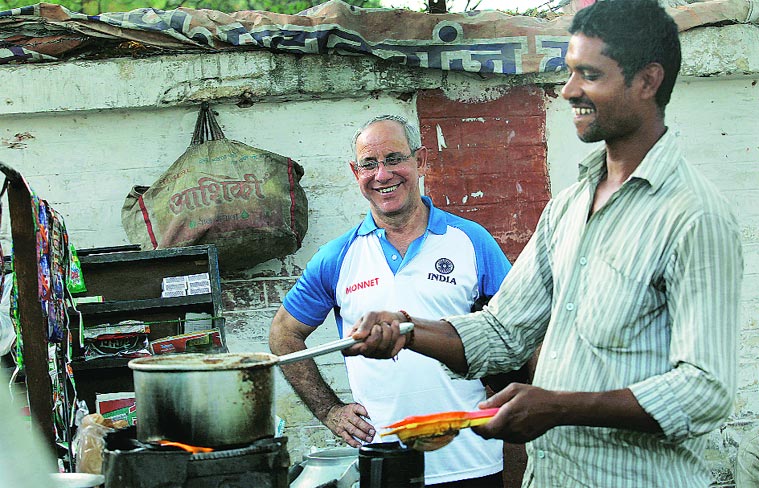When BI Fernandez shaped kings of boxing
 Fernandez received a two-year ban from AIBA for his role in Sarita Devi’s protest at last year’s Asian Games.
Fernandez received a two-year ban from AIBA for his role in Sarita Devi’s protest at last year’s Asian Games.With no major international competition scheduled for the start of the year, the boxing hall at NIS, Patiala, is largely empty these days. So, apart from a few coaches and juniors, there weren’t many who wished BI Fernandez goodbye this Tuesday. He was scheduled to catch a flight to Cuba the day after. To those present, Fernandez bid the usual farewell with the promise of meeting again.
It’s unlikely the campers would have thought too much of it. After all the diminutive white haired 60-year-old from Santa Clara, Cuba, has been an ubiquitous fixture of Indian boxing for nearly a quarter of a century. However, as things stand, it’s uncertain whether he will ever hold up a punching pad at the practice hall or shout advice from the Indian corner during competition again.
Fernandez received a two-year ban from AIBA for his role in Sarita Devi’s protest at last year’s Asian Games. With his contract up for renewal, the fact that he can’t take part in national camps, or travel with a team to competitions — could be a deal breaker. India’s federation, Boxing India, says they will make a last ditch effort at the AIBA congress next week, but insiders say a reprieve for Fernandez is unlikely. His future in India hangs in the balance.
Back in 1990, when he first answered a call from the Cuban boxing federation looking for coaches to work in India, Fernandez, who eventually had three stints in India (1990-1994, 1997-2000 and his current spell from 2004) wasn’t sure how long he would stay.
 Cuban-born national boxing coach BI Fernandez first came to India in the early 90s and has been instrumental in the country taking gaint strides in the sport. (Express photo by Ravi Kanojia)
Cuban-born national boxing coach BI Fernandez first came to India in the early 90s and has been instrumental in the country taking gaint strides in the sport. (Express photo by Ravi Kanojia)“At that time I knew one other Cuban coach who had come to India and he had only lasted a few months before he came back with a mental breakdown,” jokes Fernandez before his departure for home.
Fernandez wasn’t the only foreign coach three decades ago. Two Russian coaches worked alongside him as well. But while neither of them lasted beyond their first assignment, the Cuban kept returning. “The Russians tried to coach Indians as if they were Russians. They tried to train the boys in a very physical style. But that style didn’t suit the Indians. My first impression was that Indians had good foot movements and could be taught to counter instead,” recalls Fernandez. But there were things Fernandez had to learn as well even if he tried to impart a more Cuban style. A boxer with strong technique doesn’t block punches with his gloves but rather leans forward and slips the blow.
“That way both your fists are free to counter punch. But while our boxers would do this in practice, they wouldn’t do it in a bout because it was scary to come forward when someone is trying to punch you. So I let them lean back and block the punch. It took a generation of Indian boxers to get the confidence of slipping shots,” he says.
While he accepted there were technical areas to work on, Fernandez says it was the wrangling outside the ring that took getting used to. “In Cuba, I had always been told to fight oppression and wrongdoing. So when I came to India, I didn’t know how to react when people started putting pressure on me to pick one player over the other,” Fernandez says.
The Cuban says the appointment of GS Sandhu as chief coach (in 1992) made his job easier. “If we had to name a boxer for the national team, we both have a very strong sense that the better boxer should not suffer,” he says.
Fernandez learned to pick his fights, especially when it was for a boxer he believed in. One instance was ahead of the 1998 Asian Games, when Dingko Singh was not named in the national squad despite being picked by the coaches in the 54kg category. “They felt he was undisciplined and didn’t think he would be able to win a medal. We had to fight for him,” recalls Fernandez.
The Cuban was among the coaches who wrote to then Sports Minister Uma Bharati, protesting the decision. “We were able to get him just a few hours before the flight. And there of course he won the gold,” says Fernandez.
Dingko’s performance, however, was a rare bright spark in what was otherwise a sorry state for Indian boxing in the 1990s. Fernandez recalls how, in the early part of that decade when the Indian team went for their first training stint in Cuba, he found it difficult in setting up sparring sessions. “Our boxers couldn’t even last an entire round. We would take three boxers who we would have to rotate over a single round,” he says.
As such, simply the fact that someone from one of the greatest boxing nations was coaching them had a big impact on the boxers. “The first time I saw him I was very impressed because he was a Cuban, so I felt this must be someone who knows what he is doing,” says Akhil Kumar, who was a junior in 1999 when he first met the coach.
Indeed, one of the main reasons Fernandez had been brought in to the fledgling Indian programme were his strong fundamentals. But the Cuban also knew when to let things be. Soon after the 2004 Olympics, Brigadier Raja, based on his observation as a judge at the competition, had recommended that boxers be discouraged from employing body shots, hooks and uppercuts. Fernandez had agreed to the theory and had even given suggestions for encouraging straight punching in the junior programme.
Backing Akhil
However, when it came to the case of Akhil Kumar, who with his open guard, close punching style was the very antithesis of the approach, Fernandez was surprisingly supportive. “If I had been forced to change my style, I doubt my career would have lasted very long. But the Cuban, to his credit, encouraged me to keep my style,” recalls Akhil.
Indeed, more than Fernandez’ role in the technical aspect of the sport, Akhil values the Cuban’s contribution to the mental side of the game. “At the senior level, you can’t do much with a boxer’s technique. But the Cuban (as the boxers also refer to Fernandez) knew how to get a boxer to give all his ability. He knew what to say at the right time,” says Akhil.
Fernandez himself says the key was to be emotionally connected with the boxer. “What European coaches do is simply tell the boxer what they want and they expect the boy will do it. But what I realized over time is that Indian boxers are emotional. If I feel an attachment to them, they will do what you know they should be doing,” says Fernandez.
The mental trainer
The mental fortitude provided by Fernandez had a role to play in Indian boxing’s most iconic achievement – the Olympic bronze medal won by Vijender Singh in 2008.
“I can’t forget how tense I was before the bronze medal match at Beijing. Abhinav (Bindra) had already won his (gold) medal and before my bout, Sushil (Kumar) too had won a medal. I was the last boxer in the fray. Even Sandhu sir was tense. In the changing room, I looked at Fernandez and he oozed calmness. He walked up to me, and said, ‘Remember, Singh is King. You’re winning this medal.’ Just by looking at him I felt calm and confident,” recalls Vijender.
While Indian boxing had been steadily improving since the 2000s, the Olympic bronze was undoubtedly a path breaking moment. The win gave him credibility not just to his compatriots but also to his boxers. “You have to make the boxer believe you. So when you say he is the best he must believe that he is the best. After Vijender’s medal, when I told other boxers you are the best, they had more reason to believe me.”
Beijing was also one of the crests of the period from 2004 to 2012 which were the most productive of Fernandez’ career. They yielded an Olympic medal, two World Championship medals and a number of Commonwealth and Asian Games medals as well. Indian boxing has stuttered since owing largely to the dissolution of the federation and the lack of international exposure that it resulted in. It was similar to the setbacks Fernandes has seen hobble the Indian programme before.
“Back in 1994 before I left for the first time, we had managed to qualify six Indians to the Olympics. It was a young squad but had a lot of promise. But when I returned, four of those boxers had left to become professionals. After 2000 we lost Gurcharan and had to start all over again,” he says.
But Fernandez is more optimistic this time around. “This time the only thing holding us back is lack of competition. We still have a strong base and plenty of talent. Indian boxing can quickly return to the top,” he says.
Fernandez, however, refuses to take credit for creating that firm foundation. “It wasn’t just my contribution. It was the whole team who delivered. And during the time we did well, there was complete coordination between the coaches, the federation and the sports ministry. I was just one foreign coach in the programme,” he says.
Unlike other foreign coaches, however, Fernandez appeared to have completely immersed himself to the sport as the fact that he is the only one to win a Dronacharya award will bear out. “It wasn’t a question of money. Most overseas coaches from Cuba only get to keep a small part of their salary. The rest goes to their federation. Coach Fernandez cared deeply about Indian boxing. He was very emotional when he felt his boxer was being treated unfairly. Often we would have to calm him down ourselves,” recalls Brigadier Raja.
In a way the passion for Indian boxing runs in Fernandez’s family. He recounts an episode back in the early nineties, when Indian boxers went on their first practice tour to Cuba.
A local radio jockey had mocked the visitors, saying they reminded him of a row of punching bags. Fernandez himself hadn’t heard the broadcast, but his wife Maria did. Fernandez laughs as he recalls how his wife stormed up to the radio station, demanded to see the jockey and gave him a piece of her mind.
When Fernandes returns to Cuba, he says he feels a bit lost. “My neighbours don’t recognize me because they haven’t seen me much. A while back when I was felicitated at my old school for the Dronacharya award, all the children were clapping, but no one knew who I was. I often feel that most of my friends are in India. After all these years I find that I keep longing to get back to India,” he shrugs.
(With inputs from Mihir Vasavda and Nitin Sharma)





